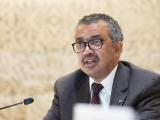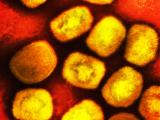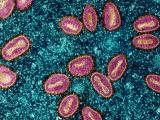The head of the World Health Organization (WHO) today announced that a surge in mpox activity in African countries, some of it involving a novel clade, constitutes a public health emergency of international concern (PHEIC) under the International Health Regulations.
At a briefing on Zoom, WHO Director-General Tedros Adhanom Ghebreyesus, PhD, accepted the recommendation of the WHO's emergency committee, a group of outside advisers, who met earlier in the day. The chair of the group, Dimie Ogoina, MBBS, an infectious disease specialist who is professor of medicine at the Niger Delta University in Nigeria, said the 15-member group's recommendation was unanimous.
Today's PHEIC declaration marks the second for mpox. In July 2022, the WHO made a similar declaration following the emergence of clade 2 and rapid global spread. The agency ended that PHEIC in May 2023, noting that remaining challenges were best handled by long-term efforts.
A clear call by emergency committee
Tedros said the detection of a new clade 1 virus has been detected in the Democratic Republic of the Congo (DRC) and is spreading through social networks against the backdrop of complex transmission patterns that also involve other modes and other clades. He said the new clade 1b virus has already spread to neighboring countries.
"The potential for future spread is very worrying," he said, adding that the situation means that coordination of the international response is essential.
Ogoina said the situation clearly met the requirements for a PHEIC, including that the surge in Africa is an extraordinary event, involves a new strain that may be more severe than the global mpox clade 2 virus, and that the virus is circulating in parts of east Africa, including some that hadn't reported mpox cases before.
The potential for future spread is very worrying.
He said the advisory committee will flesh out its temporary recommendations for publication in the days ahead, but he urged countries to make investments in knowledge gaps, including identifying all the ways the disease is spreading, and to target interventions based on local context.
The announcement comes a day after Africa Centres for Disease Control and Prevention (Africa CDC) declared its first public health emergency of continental security, citing a worsening situation, with complex outbreaks and information gaps in multiple countries, especially the DRC.
Surveillance gaps among vaccine rollout challenges
Though mpox vaccines have been successfully used to blunt transmission outside of Africa during the global clade 2 outbreak, global health officials have emphasized a lack of vaccine for Africa, which bears an ongoing endemic burden.
An estimated 10 million vaccine doses are needed for the current outbreaks in Africa, but so far only the DRC and Nigeria have taken the first regulatory steps to allow supplies to be used.
At today's briefing, Tim Nguyen, MPH, who heads the WHO's High Impact Events Preparedness unit, said the WHO has been taking stock of global supplies. He said there are about 500,000 doses of the MVA BN vaccine, the smallpox-mpox vaccine made by Bavarian Nordic under the Jynneos brand, with another 2.4 million doses that could be produced by the end of the year if there are orders. The company said it could produce another 10 million doses in 2025.
He said there is a second mpox vaccine called LC16, which isn't commercially available but with considerable supplies in Japan's stockpile.
Maria Van Kerkhove, PhD, acting director of the WHO’s Department of Epidemic and Pandemic Preparedness and Prevention, said that, before vaccine deployment, health officials need a much better understanding of how the disease is spreading to make best use of supplies. She said the outbreaks are complex, involving different changes and shifts in epidemiology.
However, she urged countries to come forward to work with the WHO to signal interest in donating vaccine supplies. "We need good visibility."
Last week, the WHO invited mpox vaccine makers to submit formal interest in having their products emergency-listed by the WHO. Officials today said one company is prepared to submit its paperwork by the end of the week, and meetings are planned next week with the second manufacturer. Officials projected that the WHO's technical advisory group on mpox vaccines will meet in the middle of September to discuss emergency listing.
The US Department of Health and Human Services (HHS) today said it is closely monitoring the spread of clade 1 mpox in Africa and over the last few months has provided $17 million in preparedness and response support. It said the US would donate 50,000 doses of Jynneos to the DRC.
Also today Bavarian Nordic yesterday announced a new order of 175,420 doses from the European Health Emergency Preparedness and Response Authority for donation to Africa CDC to support its response. It also said it would donate 40,000 doses to HERA, also earmarked for Africa CDC.



















